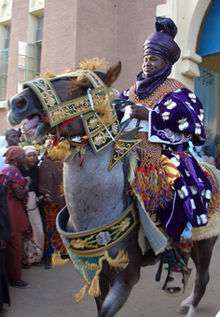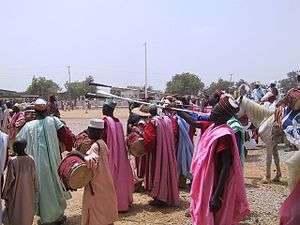Durbar festival


A Durbar festival is an annual festival celebrated in several cities of Nigeria. This festival marks the end of Ramadan and is also shared with eid el Kabir and eid el Fitri, Muslim holidays. It begins with prayers, followed by a parade of the Emir and his entourage on horses, accompanied by musicians, and ending at the Emir's palace. Durbar festivals are organised in cities such as Kano, Katsina, Sokoto, Zaria and Bida, and are considered tourist attractions.
History
The Durbar festival was introduced to Nigeria by colonial administrators with political objectives in mind.[1] The word Durbar is of Persian origin and it was first linked to ceremonial assemblies marking the proclamation of Queen Victoria as the Empress of colonial India in 1877. In Nigeria, the events then were ceremonial in nature, the first Durbar was held in 1911, subsequent ceremonies were held in 1924, 1925, 1948, 1960 and 1972. The ceremonies linked together pre-colonial aspects of martial display, colonist created assemblies and celebrations of important events in Northern Nigeria.[2]
Festac
The Durbar festival featured prominently in the 2nd World Black and African Festival of Arts and Culture sometimes known as Festac 77. Since Festac, the colonial origins was gradually phased out and the events were linked with pre-colonial traditions such as the importance of horses for military purposes and ceremonies in the Bornu Empire and the ceremonies of 'Hawan Sallah' and 'Hawan Idi'.